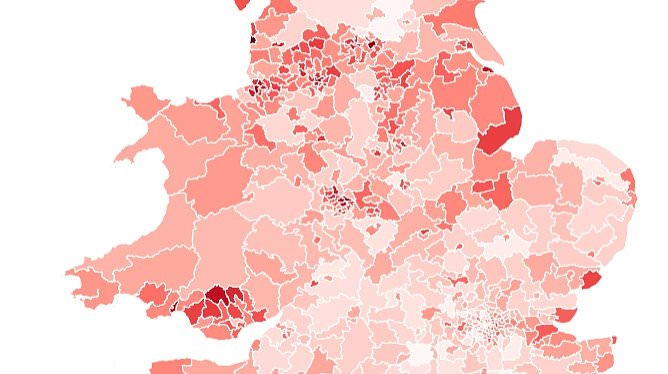Share this @internewscast.com
Dozens of areas of England and Wales have today been flagged as premature death hotspots.
Blackpool South has the highest premature mortality rate, MailOnline analysis shows. For every 100,000 men living there, nearly 730 died last year before turning 75.
Although that rate appears small, it is 3.4 times higher than in North East Hampshire (214.3 per 100,000) – the area of the country where men have the best chances of avoiding an early grave.
Professor Karol Sikora, an oncologist with 40 years of experience who once advised ministers and acted as the World Health Organization’s cancer chief, described the rate in Blackpool South as ‘dreadful’.
He added: ‘Anything above 500 is bad news.’
Yet Government figures suggest 76 of the 575 parliamentary constituencies – or one in eight – exceed that rate.
All rates are age-standardised, meaning they factor in the age distribution of different areas, this is because comparing two populations that have different age structures is not fair.

Experts say premature deaths are linked to a poor lifestyle and a lack of education, both of which are linked to poverty
Professor Sikora said: ‘These scores reflect poverty.
‘People with less money have less education, and they tend to have more unhealthy lifestyles, from everything to smoking, alcohol, obesity, everything you can imagine, lack of exercise, poor diets, poor housing conditions.
‘All this leads to illness, and that leads to earlier mortality.
‘It is bound to get worse without major policy changes.’
However, Professor Sikora points out that not all communities face the same outcomes.
He said: ‘There are some exceptions. I mean, it’s quite amazing. For example, the South Asian population in Slough live remarkably long, and they do remarkably well, and they tend not to be obese. So it’s not just poverty, it’s a whole series of things around it.’
The original mortality data, held by the Office for National Statistics (ONS), lay bare a clear North-South divide.
Out of the 20 constituencies with the worst premature death rates, 13 of them were in the north and three in the Midlands.
For comparison, 16 out of 20 areas with the lowest figures were in the south.
Behind Blackpool South came Middleborough and Thornaby East (685.8) and Leeds South (670.4).
Premature deaths may happen from illnesses such as cancer, heart disease, injuries, violence and even suicide.
Although Professor Sikora explains the main driver of premature mortality is lifestyle, he says a secondary factor is access to healthcare.
He said: ‘We have a free system, the NHS. But we know that poorer people access it differently from wealthier people, even though it’s free.
‘So it’s not so much wealth. It’s education. The better educated people can use a complex system more effectively than people who have no education.

Blackpool South has the highest premature mortality rate. For every 100,000 men living there, nearly 730 died last year before turning 75, that’s 3.4 times higher than in the lowest area
‘They just know how not to get aggressive, because getting aggressive doesn’t help, but how to push for what they want in a quiet sort of way, and so access to health care.’
Professor Sikora also points out that the best specialists and the best GPs often choose to live in the most desirable areas, not in deprived areas.
The ONS data, which defines a premature death to be anything before 75, does not include Scotland or Northern Ireland.
The analysis comes after a study last year concluded one in four premature deaths will be due to cancer between 2023 and 2050.
This equates to around 50,000 per year, according to the Organisation for Economic Co-operation and Development (OECD).
It warned that the ‘current trajectory of cancer costs is unsustainable’.
Professor Sikora says cancer deaths often follow the same pattern as other deaths, with lifestyle factors such as smoking, alcohol, obesity, lack of exercise, poor quality, diet, all posing risks.
He also said poorer people are less likely to access treatment as they don’t go for screening, don’t have mammograms and don’t turn up for tests when they’re asked to.

Karol Sikora, 76, is a world-renowned physician specialising in oncology, who has been described as a leading world authority on cancer
‘They often just don’t bother going to the hospital, or when they do, they go when it’s late. They haven’t got the money to get on public transport and get there. So they just skip the hospital appointments and so on’, he said.
Peter Matejic, chief analyst at the poverty fighting charity Joseph Rowntree Foundation, said: ‘It’s heartbreaking that some areas have such high rates of premature deaths.
‘We have known that there are links between poverty and worse health outcomes for decades, and as a nation that is a gap we should be narrowing.
‘Many factors throughout your life can lead to dying prematurely, but your economic situation affects your health at every stage, from what you eat as a child to whether you can afford essentials as an adult.
‘The nation’s health needs a real focus from the government but this isn’t just about the NHS – it’s about whether people are able to lead healthy lives with dignity and hope.’













